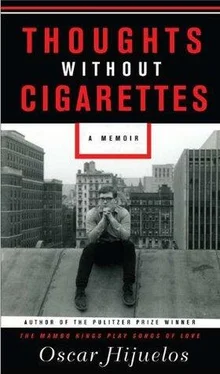Later, at a certain moment of the day, when, for all I know, it could have been raining, or sunny, or snowing outside, Magdalena too first walked into that building and saw her startled face reflecting back at her infinitely in the hallway mirrors; she probably felt faint as she entered the apartment and looked around. A believer in intuition and prophetic dreams in the first place, thanks to good old Cuban superstition, she needn’t have been a sibyl to figure out that her life would never be the same again. No doubt she felt relieved to be with my father, who, for the most part, treated her in a courtly and affectionate manner in those days. Borja, balanced and affable, made her feel at home as well. It’s the agitated, scolding Maya who probably gave her one of her dismissive looks the moment their eyes met. With Borja and Eduardo sleeping in the master bedroom, my mother spent her first night in New York in one of the apartment’s back rooms — where I would one day stay — beside my father, breathlessly. How strange she must have felt to be there, for to someone from the tropics, New York must have seemed a rather purgatorial and strange place at best, and overwhelming: On some level, she must have despaired — I’d never hear her once say she “loved” the city the moment she arrived — and yet, she was now with her husband. Besides, not knowing more than a handful of words in English, if any, what was she to do?
By then, my father had decided he would stay in New York for the long run. He’d made new friends, for in that epoch, however far away or scattered the Cubans of that city were, they inevitably found one another in the dance halls and on the streets, or just turned up one day, knocking on the door. He’d also started to run out of his inheritance money — some five thousand dollars, I’ve heard — and, bored with just hanging around the apartment, kept his eyes open for a job. He was a bright man, though a little too trusting of strangers, a country boy with a decent secondary school education from Cuba, which meant that he could read and write and cipher, but what skills he possessed — that of a farmer, work that he had no taste for, and of a horseman who had once spent a year as a mounted postal courier delivering mail in the countryside around Jiguaní—could hardly lead to any job possibilities in the city. (And his English was not so good yet, sabes ?)
In the end, the only kind of work he, without any particular skills, managed to find, even during those war years, came down to busing tables and washing dishes in one of the restaurants of a famous midtown hotel, the Biltmore, which took up the entire block at Madison Avenue and Forty-third; it was a job he’d landed through a Cuban fellow named Rubén Díaz, whom he’d met at one of those joints, maybe in the roof gardens of the Hotel Pennsylvania or at the Savoy, where Pedro and the Cugat orchestra sometimes performed. And while he’d eventually work his way up in the kitchens, making breakfasts for on-the-go businessmen in the second-floor dining room and then as a short order cook in the Biltmore Men’s Bar — what my brother and I would always more grandly refer to as a “chef” because he wore a white toque — he had started at the bottom, which didn’t seem to bother him at all.
He came by that job just in the nick of time, for it wasn’t long before my mother had become pregnant with my brother, José. Nevertheless, neither his new position nor my mother’s delicate state seemed to slow him down when it came to his passion for New York nightlife, and it seems that while he still had some money, he didn’t allow his marital status to get in the way of his primal enjoyments. She found this out when one of his admirers mailed her a barely literate letter. Whoever this lady happened to be, she scribbled down her confessions in pencil and shakily so, her writing and spelling so bad that my mother, waving the letter in my father’s face, gloated: “She’s not only a whore, but ignorant as well!” Still, her pain at finding out that he had turned into a parandero —that is, a roving sort with an eye for the ladies — must have been intense. She’d always say that it wasn’t really in his nature, or at least he had never been that way in Cuba (though maybe he was). Left alone in that apartment on those nights, she could have hardly been thrilled when he finally came home at three or four in the morning, reeking of booze, perfume, and who knows what else.
For her part, to add insult to injury, she soon learned, thanks to Maya, about the true nature of her status in that household: as a servant whose job was to cook and clean the apartment and to otherwise tend to everyone’s needs. (“I was nothing more than a slave,” she’d one day say.) In that inescapable circumstance, my mother became a virtual captive, and whether she liked it or not, each day Maya, home from her job and expecting to be waited on, found new ways to torment her. The insults were one thing, the ordering her about like a Cuban Cinderella another; but the worst of it was that she threatened to put my mother, pregnant or not, out into the street.
Not that my mother lived in complete despair or had no friends whatsoever. My future godfather, Horacio, tended to keep my mother company on those nights when my father and his sisters went out. (Nothing romantic ever took place between them, by the way — for the perennially unmarried Horacio happened to be the kind of man who, if a shapely woman and a handsome fellow passed by at the same time, chose to check out the latter, with a quick turn of the head, a slight redness rising in his face.) It was during those years that another Cuban family, the Garcías, moved onto the block, and here and there, usually at Sunday Mass, which she was allowed to attend with her sisters-in-law, she’d meet some of the other Latinas in the neighborhood — sending out radar, they just found one another. Somehow a few of her English-speaking neighbors took a liking to her as well. Never having any inclination or opportunity to study English, my mother somehow managed to get by with those neighbors with smiles, nods, and a handful of words and phrases. Along the way, she made a few English-speaking friends, who were patient with her syntax or perhaps found her way of talking amusing — among them, and most wildly so, a certain Mrs. Betty Walker, or “ la muda ,” from up on the fourth floor, a deaf mute with a brood of kids to look after, whose grunts and wild gesticulations were easier for my mother to follow than any English, the two of them often carrying on in the hall about heaven knows what to any passerby’s amusement.
None of her new acquaintances, however, were as gracious or attentive or sophisticated as the forty-year-old Argentine beauty Jacqueline Vidal, who, working as a wartime volunteer in the obstetrics ward of the St. Luke’s Woman’s Hospital on East 110th Street, had been on hand to assist in the delivery of José, in December 1944. That’s how they became friends, not only because Jacqueline, or Chaclita, as she would be nicknamed, spoke a soothing Spanish in a ward where none of the other nurses did, but because she, a musical prodigy on the violin who often performed with her sister María-Luisa on the classical circuit of New York, exuded the kind of cultural refinement that simply reminded my mother of the people she had known during her childhood. Which is to say that, bewildered and stranded as my mother may have felt, it was Jacqueline, whose artistic hands were the first to touch my brother’s brow, who became her lifelong friend.
Of course it wouldn’t be right to say that my father never took my mother anywhere: She visited Central Park and the Bronx Zoo and saw such landmarks as the Empire State Building, which, however, she never ascended. (In one of the photographs of her from that time, she sits, rather well turned out, on a park bench, looking frostily uncomfortable between her female in-laws, though the one I most like from that period is of my father, dapper in a hat and scarf and topcoat, posed in Central Park, holding with pride a chunk of snow in his begloved hands.) In general, aside from being sequestered in the household like a “slave,” my mother, speaking only Spanish, rarely got around on her own. Once my brother was born, however, and she was further housebound save for occasional excursions with a baby carriage out to the park, another complication in her life arose. This had to do with the fact that Maya, having reached her forties, was childless.
Читать дальше












